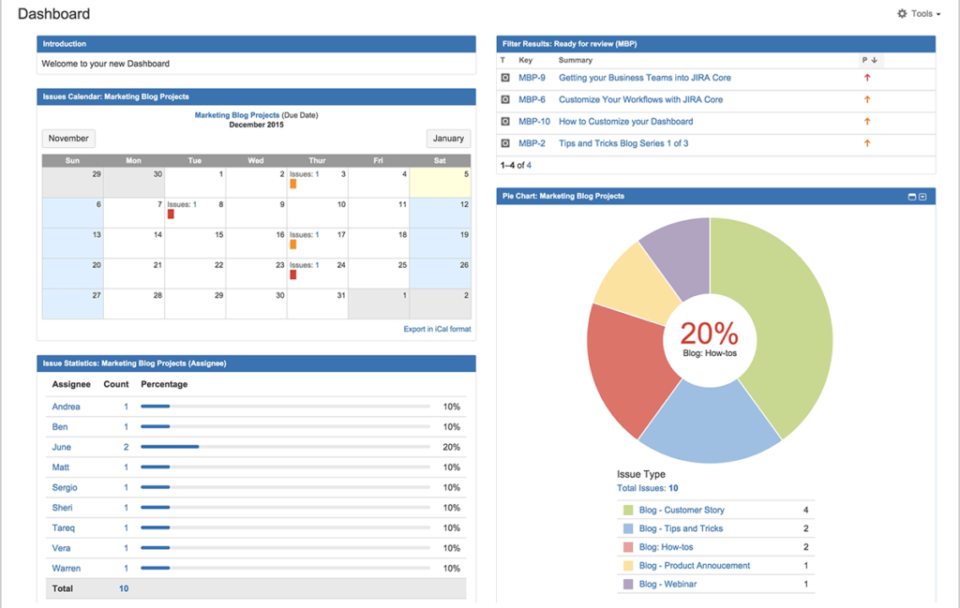Are you looking for DevOps or DevSecOps tools? Then keep reading, as we will share some of the best of each category.
What Is DevOps?
DevOps is a relatively new model of the software development life cycle (SDLC). True to its name, DevOps combines the development (Dev) and operations (Ops) phases of the SDLC, managing them as a single, integrated workflow. Through DevOps, teams can take advantage of task and process automation, increase development and scalability speed, and issue software releases frequently.
The Best DevOps Tools
DevOps tools include all applications, servers, platforms, etc., used in the DevOps methodology. Here are some of the best of the bunch.
Jira
Jira is a widely used platform that helps with bug and project tracking, and it is available either on-premise or as SaaS. Jira’s user-friendly interface makes it easy to see a project’s development status, manage releases and dependencies, create pull requests, view progress, and so forth.
Jira makes task automation simple with a drag-and-drop interface, plus it connects to tools like GitHub, Microsoft Teams, and Bitbucket. Beyond that, the tool also offers advanced reporting, roadmaps, Kanban and Scrum boards, and more.
You can learn more by reading our article: Jira Review: Pricing and Features.
Git
One of the top DevOps offerings used by teams throughout the software industry is Git. It is a free and open-source code management and version control tool that can help track the progress of development projects, both large and small. Git lets you save different source code versions and revert to previous ones easily. Plus, it allows you to experiment by creating separate branches and incorporate new features once ready.
Reading: Getting Started with Git
Gradle
Every DevOps stack needs a trusty build tool, and Gradle is just that. This multiple-language build automation tool has been around since 2009, and it supports C++, Java, Python, and more.
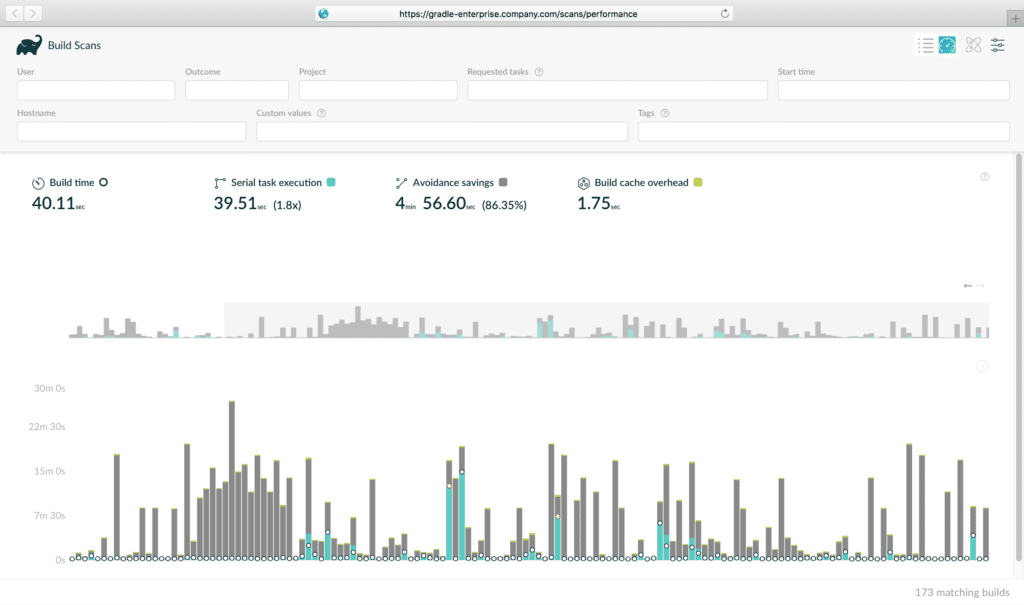
According to Gradle, its compile time is 100 times faster than one of its top competitors, Maven. How can it produce such speed? Chalk it up to Gradle’s use of incrementality, its build cache that recycles task outputs, and its daemon that maintains information in memory between builds.
Reading: Gradle vs Maven: DevOps Tool Comparison
SonarQube
You get support for 27 programming languages with SonarQube, an automated, open-source code review tool. SonarQube works wonders for analyzing application source code written in various languages, and it lets you focus on code security and quality throughout the development process since it automatically checks your code against thousands of code analysis rules.
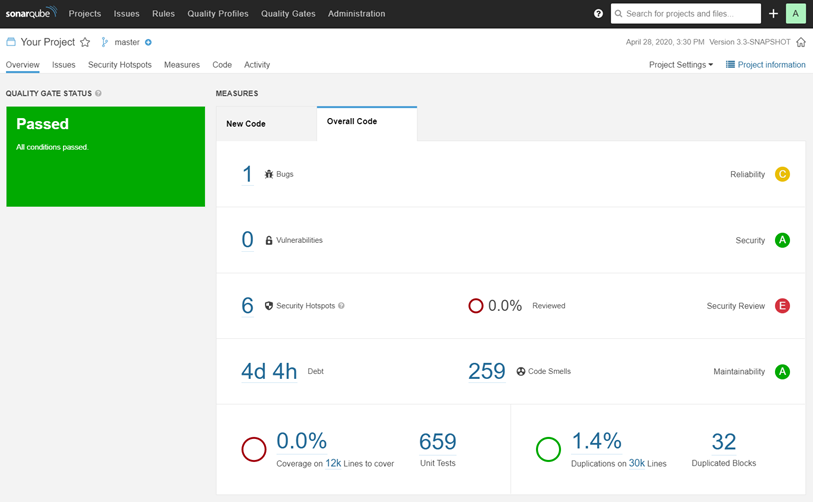
SonarQube’s top feature is its quality gates that scores your code by factoring in vulnerabilities, bugs, duplications, coverage, and code smells. In doing so, the tool determines whether or not your source code passes the quality gate, making it suitable for release to the public.
Beyond checking the health of your code, SonarQube also pinpoints any new issues and gives you plenty of visualizations to give you deeper insight into your code base’s overall state. SonarQube is easy to configure, integrates with other DevOps tools like GitLab, Bitbucket, GitHub, etc., and works on-premise and in the cloud.
docker
Since its launch eight years ago, many have considered docker to be one of the top container platforms and DevOps tools on the market. It automates the deployment process and makes applications more secure and portable across environments by isolating them into separate containers.

Dependency management is not an issue with Docker since it lets you combine all dependencies in a single app’s container and ship it as an independent unit. From there, you can run the application on the platform or machine of your choice without worry.
You can optimize your DevOps workflow by integrating it with CI/CD (continuous integration/continuous delivery) servers like Bamboo or Jenkins. And if you are looking to perform a cloud migration, Docker can help with that, too, since it supports all of the top cloud providers, including Google Cloud and Amazon Web Services.
Reading: Docker: A cheat sheet
Jenkins
Jenkins is a top open-source automation CI/CD server that offers a massive ecosystem of plugins to help you build, deploy, and automate projects. You can integrate Jenkins with nearly any DevOps tool you can think of, including the aforementioned Docker, and you can use it to get your customized CI/CD pipeline up and running with ease. Iterating and deploying fresh code with Jenkins is a breeze, as is measuring the success of each step in your pipeline.
Reading: GitHub vs Jenkins Tool Comparison
Bamboo
Another popular DevOps tool in the Jenkins mold is Bamboo from Atlassian. However, unlike Jenkins, which is open source, this CI/CD server solution that aids with automation from builds to deployment will cost you.
You can integrate Bamboo with other Atlassian offerings like Bitbucket and Jira. And its configuration could not be easier thanks to a bevy of pre-build functionalities that Jenkins lacks out of the box.
Reading: Bamboo vs Jenkins Tool Comparison
What Is DevSecOps?
DevSecOps is short for development, security, and operations. In the past, security was tackled on to software at the end of the SDLC, almost as an afterthought. With so many software updates coming out, that is no longer sufficient, which is why DevSecOps automatically integrates security into each phase of the SDLC, from design to delivery. Not only does DevSecOps help teams release secure software, but it also does it without slowing down the SDLC by addressing security issues when they appear and before they become too complex and costly to fix.
Reading: An Introduction to DevOps and DevSecops
The Best DevSecOps Tools
What are some of the top DevSecOps tools on the market? Have a look below to learn about some of the best on the market.
codacy
codacy is a solution that automates code reviews for over 40 programming languages. Developers can use its static code analysis tool to pinpoint any vulnerabilities in early development while also minimizing long-term security flaws. Codacy allows for flexible development via Git integration and will even alert you when a security issue is detected.
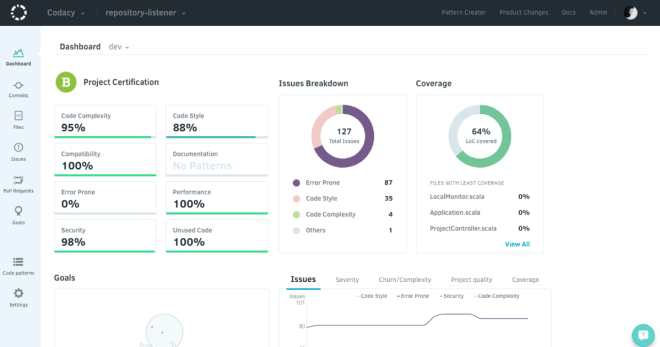
Prism Cloud
If you are looking for an automated security tool for your cloud-based DevSecOps project, Prism Cloud may be right up your alley. This DevSecOps tool offers automated security scanning, Git integration, policy editing, and live feedback and mitigation.
WhiteSource
Here is a tool that deals solely with open-source DevSecOps. WhiteSource offers real-time alerting and uses a combination of a component and license database and a vulnerabilities database to thoroughly check open-source components prior to deployment.
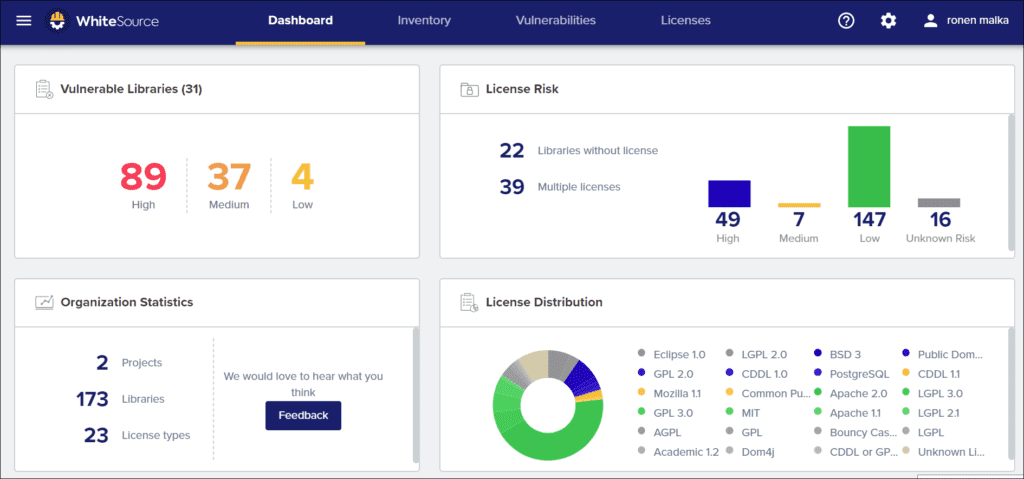
If WhiteSource detects an issue, it offers guidance on how to fix it as quickly as possible to reduce your resolution times. Another WhiteSource feature worth mentioning is its CI/CD pipeline and Git integration.
Reading: WhiteSource Pricing and Reviews
Acunetix
This DevSecOps tool uses a catalog of 7,000-plus documented vulnerabilities to scan and test web apps for security issues. Acunetix also has an Acusensor feature that combs over source code to look for problems like XSS openings and SQL injections.
Checkmarx
Checkmarx is a DevSecOps tool that scans and tests source code for security issues via multiple modular utilities. One example is the Software Composition Analysis module, which checks your open-source code against a vast library of issues. Another is the Static Application Security Testing module, which helps spot source code issues during development. Beyond those features, Checkmarx also offers AWS and Gitlab integration.
Aqua Security
Aqua Security is a platform that focuses on IaaS, applications, and VM/container security. With it, you can scan for the presence of malware, exposed secrets, and any security vulnerabilities.
The DevSecOps tool also offers complete scanning in real-time environments, comprehensive CI/CD integration, configurable dynamic deployment policies to combat accidental breaches, and more.
